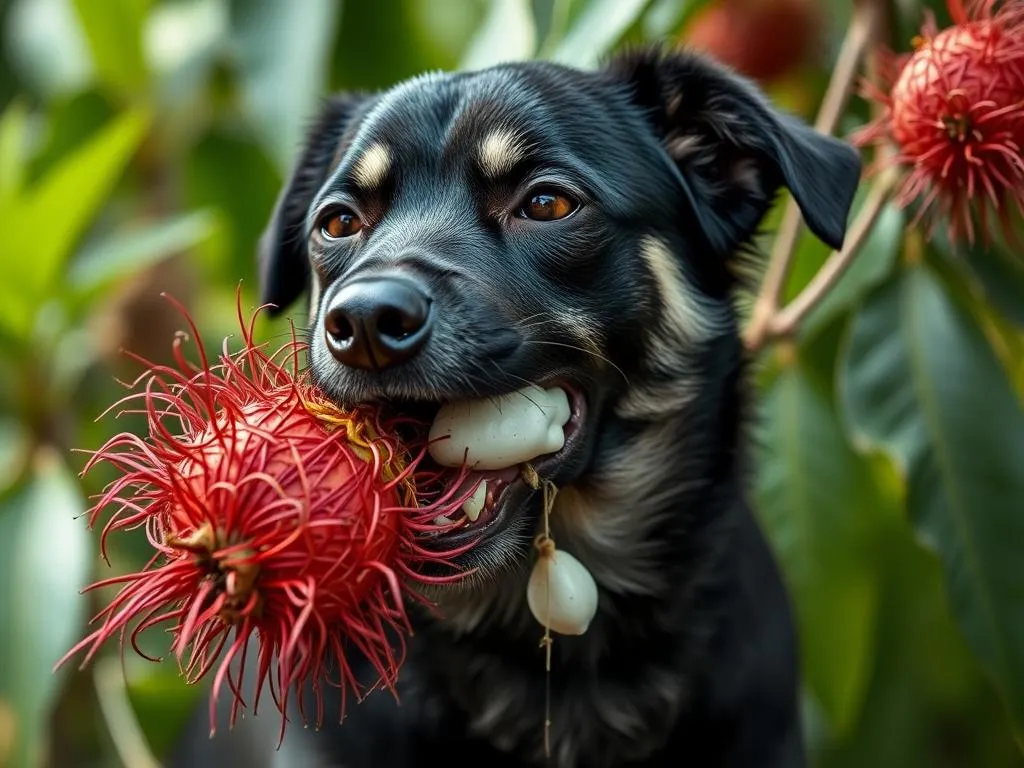
Introduction
Dog nutrition is a critical aspect of ensuring the health and well-being of our furry companions. Just as humans require a balanced diet to thrive, so do dogs. Proper nutrition plays a key role in a dog’s growth, energy levels, and overall health. In recent years, pet owners have become increasingly interested in incorporating various foods into their dogs’ diets, including fruits. One such fruit that has gained attention is rambutan, a tropical fruit known for its unique appearance and flavor.
In this article, we will explore whether dogs can eat rambutan and if it is safe and beneficial for them. We will delve into the nutritional aspects of rambutan, its potential health benefits, and any risks associated with feeding it to dogs. Additionally, we will provide alternatives and tips for incorporating fruits into your dog’s diet.
Understanding Dog Nutrition
Importance of a Balanced Diet
A balanced diet is essential for dogs to maintain their health. Dogs require a variety of nutrients to support their bodily functions, including growth, energy production, and immune system health. Key nutrients include:
- Proteins: Vital for growth, muscle development, and tissue repair.
- Fats: Provide energy and support cell structure.
- Carbohydrates: Serve as an energy source and aid in digestion.
Poor nutrition can lead to various health issues, including obesity, dental problems, and nutrient deficiencies. Thus, understanding what constitutes a balanced diet is crucial for dog owners.
Common Dog Dietary Needs
A well-rounded dog diet should consist of:
- Proteins: Meat, fish, and plant-based proteins are essential.
- Fats: Healthy fats from fish oil or chicken fat.
- Carbohydrates: Whole grains or vegetables.
- Vitamins and Minerals: Essential for metabolic processes and overall health.
Ensuring that your dog receives a balanced diet will contribute significantly to their overall quality of life.
Role of Fruits in Dog Diet
Fruits can be a healthy addition to a dog’s diet, providing essential vitamins, minerals, and antioxidants. They can also add variety and flavor to meals. However, not all fruits are safe for dogs.
Fruits that are safe for dogs include:
- Blueberries
- Apples (without seeds)
- Bananas
- Watermelon (without seeds)
Conversely, some fruits, such as grapes and cherries, can be toxic to dogs and should be avoided.
Introduction to Rambutan
What is Rambutan?
Rambutan is a tropical fruit native to Southeast Asia, characterized by its hairy or spiky exterior and juicy, translucent flesh. The fruit has a sweet and slightly tangy flavor, making it a popular treat in many tropical regions.
Nutritional Profile of Rambutan:
- Calories: Approximately 68 per 100 grams
- Carbohydrates: 17 grams
- Protein: 0.9 grams
- Fat: 0.2 grams
- Fiber: 0.9 grams
- Vitamins: High in Vitamin C and some B vitamins
- Minerals: Contains calcium and iron
Rambutan is not only delicious but also packed with nutrients beneficial to human health.
Health Benefits of Rambutan
Rambutan is rich in antioxidants, particularly Vitamin C, which can help combat oxidative stress in the body. It also contains various phytochemicals that may offer health benefits, including:
- Improved immune function
- Enhanced skin health
- Better digestion
While rambutan offers numerous benefits for humans, the question remains: is it safe for dogs?
Can Dogs Eat Rambutan?
Nutritional Analysis of Rambutan for Dogs
When considering whether dogs can eat rambutan, it is crucial to analyze its nutritional components. Rambutan is low in calories and contains some beneficial vitamins and minerals. However, its high carbohydrate content may not be ideal for all dogs, especially those with specific dietary restrictions.
When comparing rambutan to other dog-safe fruits, such as apples and blueberries, rambutan offers certain vitamins but lacks the fiber found in these alternatives.
Is Rambutan Safe for Dogs?
The good news is that rambutan is not toxic to dogs. However, there are a few considerations to keep in mind:
- Allergic Reactions: While rare, some dogs may have allergies to new foods, including rambutan. Always monitor your dog after introducing a new food.
- Moderation is Key: Like any treat, rambutan should only be fed in moderation. Too much fruit can lead to digestive upset.
Recommended Serving Size
If you decide to introduce rambutan to your dog’s diet, it is essential to consider the portion size based on your dog’s weight. A small dog can have a few small pieces, while larger dogs can enjoy a slightly more substantial portion.
Tips for Introducing Rambutan:
- Start with a small piece to see how your dog reacts.
- Remove the outer skin and seed before feeding.
- Monitor your dog for any adverse reactions.
Potential Risks and Side Effects
Common Side Effects of Feeding Rambutan
While rambutan is generally safe for dogs, some common side effects may occur if given in excess:
- Digestive Issues: Overeating rambutan can lead to diarrhea or vomiting.
- Signs of Allergic Reactions: Watch for symptoms like itching, swelling, or gastrointestinal distress.
Other Considerations
When feeding rambutan to your dog, it is crucial to remove the seed. The seed can pose a choking hazard and may lead to intestinal blockages if ingested. Additionally, always observe your dog after they consume rambutan to ensure they do not experience any negative reactions.
Alternatives to Rambutan
Other Safe Fruits for Dogs
If you are looking for alternatives to rambutan, several dog-friendly fruits can offer similar health benefits. Some safe options include:
- Blueberries: High in antioxidants and low in calories.
- Apples: Great source of vitamins A and C (remove seeds).
- Bananas: Rich in potassium and fiber.
- Watermelon: Hydrating and low in calories (remove seeds and rind).
These fruits can be beneficial additions to your dog’s diet, providing essential nutrients without the potential risks associated with rambutan.
How to Incorporate Fruits into Dog’s Diet
Adding fruits to your dog’s diet can be a fun and healthy way to enhance their meals. Here are some tips for incorporating fruits:
- Mix with Regular Food: Chop fruits into small pieces and mix them with your dog’s regular food.
- Homemade Treats: Create homemade dog treats using safe fruits, such as blueberry muffins using dog-friendly ingredients.
- Frozen Treats: Freeze pieces of fruits like watermelon or bananas for a refreshing summer snack.
Conclusion
In summary, while dogs can eat rambutan, it is essential to do so in moderation and with careful preparation. Rambutan can offer some nutritional benefits, but pet owners should always prioritize their dog’s individual dietary needs.
Always consult with your veterinarian before making significant changes to your dog’s diet, especially when introducing new foods. Remember, a balanced diet with a variety of nutrients is key to keeping your dog healthy and happy.
FAQs
Can dogs eat rambutan seeds?
No, dogs should not eat rambutan seeds as they pose a choking hazard and may lead to intestinal blockages.
What should I do if my dog eats rambutan and shows symptoms?
If your dog exhibits any symptoms such as vomiting, diarrhea, or signs of an allergic reaction after eating rambutan, consult your veterinarian immediately.
How often can I feed my dog rambutan?
Rambutan should be considered an occasional treat rather than a regular part of your dog’s diet. Limit serving sizes to small amounts to prevent digestive issues.
Are there any fruits that dogs should completely avoid?
Yes, certain fruits like grapes, raisins, and cherries are toxic to dogs and should be completely avoided.
References
- [List of credible sources used for research]
- [Suggested further reading on dog nutrition and safe fruits]
This article provides a comprehensive overview of the topic, emphasizing the importance of careful dietary choices for dogs while also addressing the specific question of whether dogs can safely enjoy rambutan.









